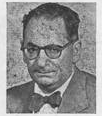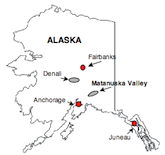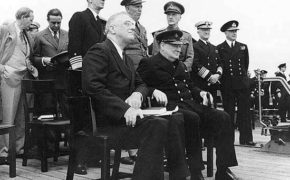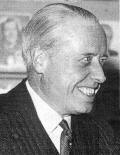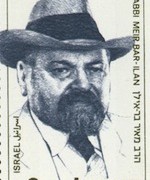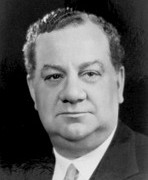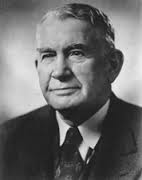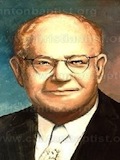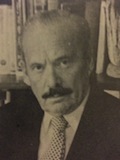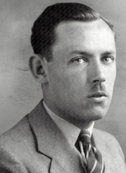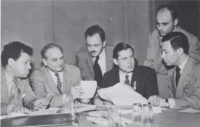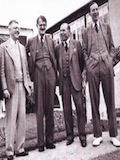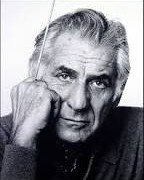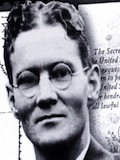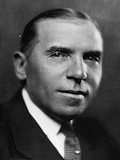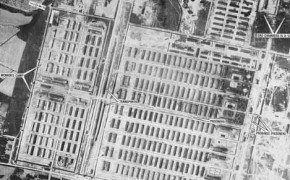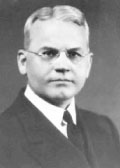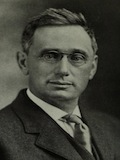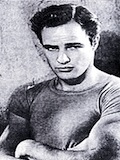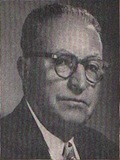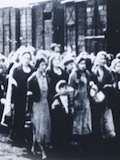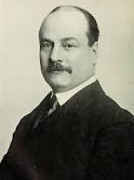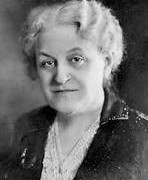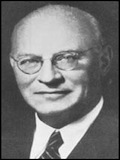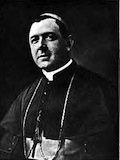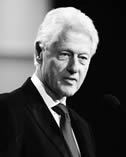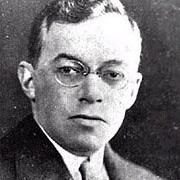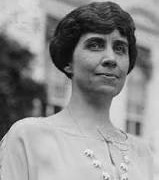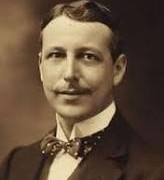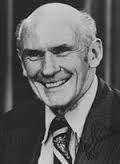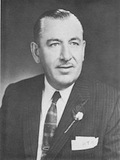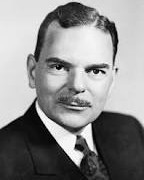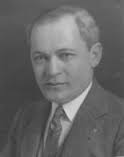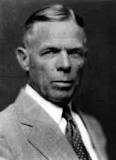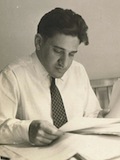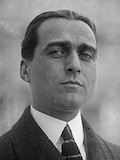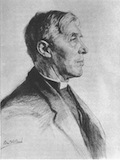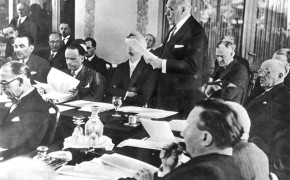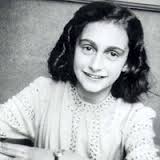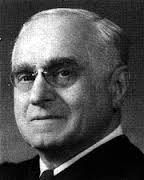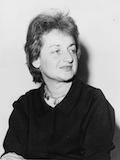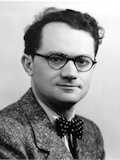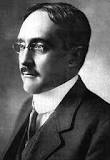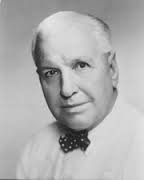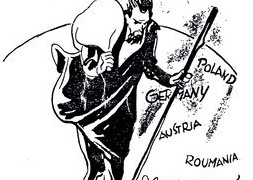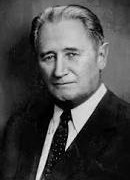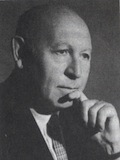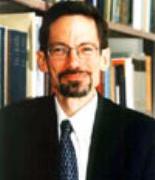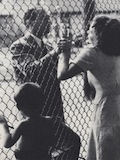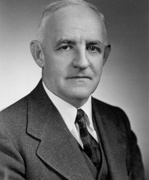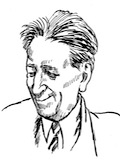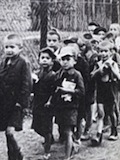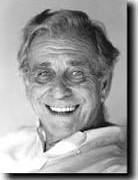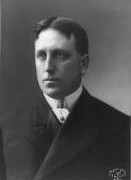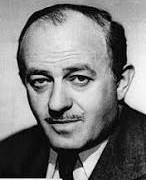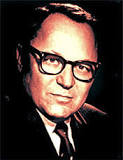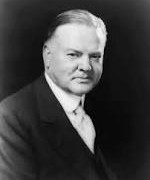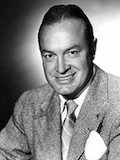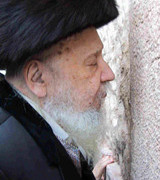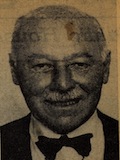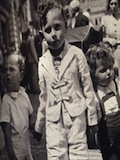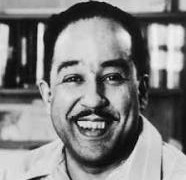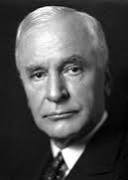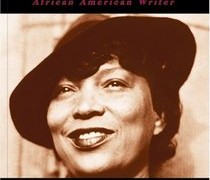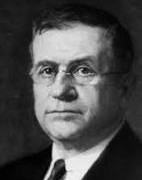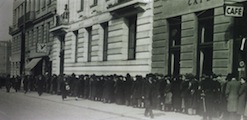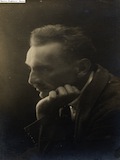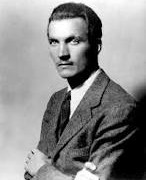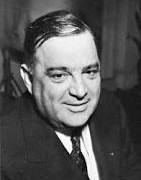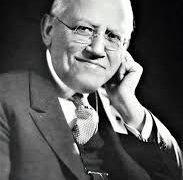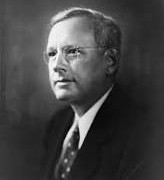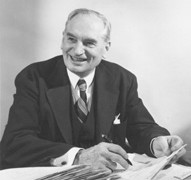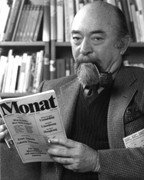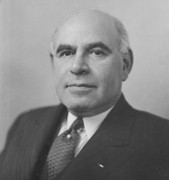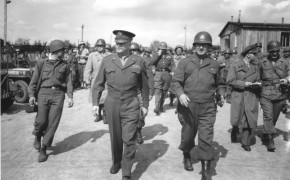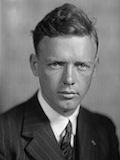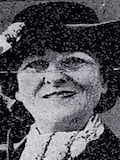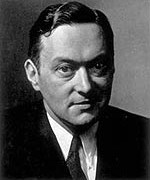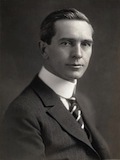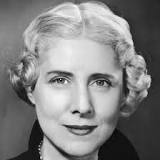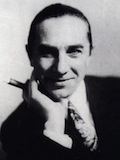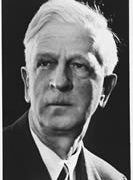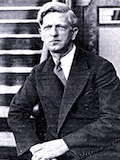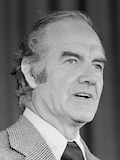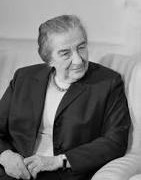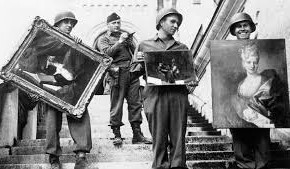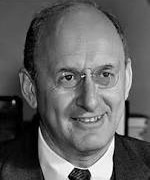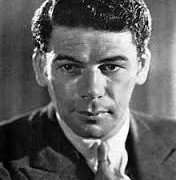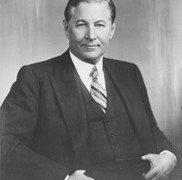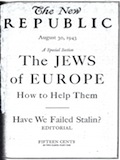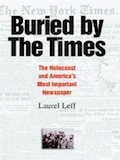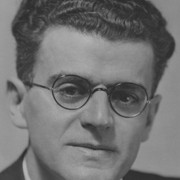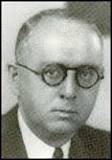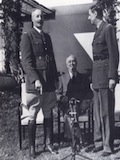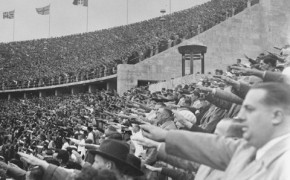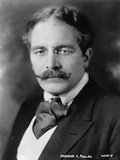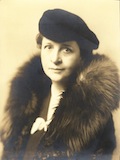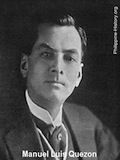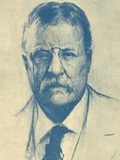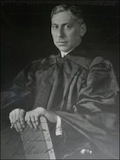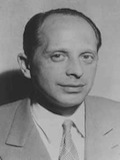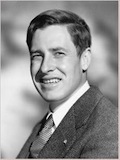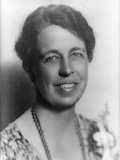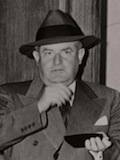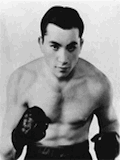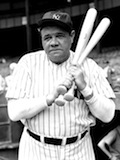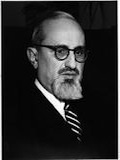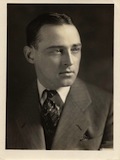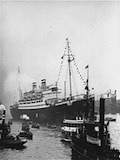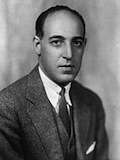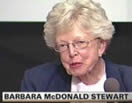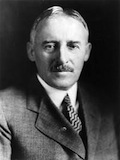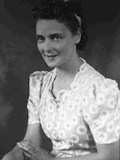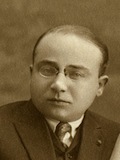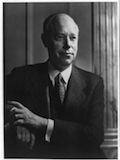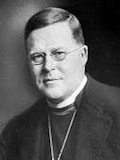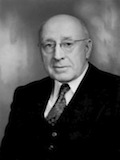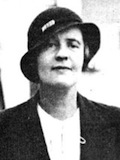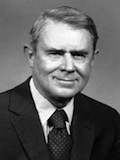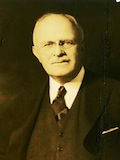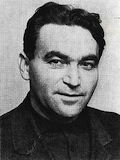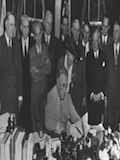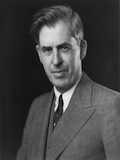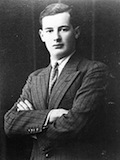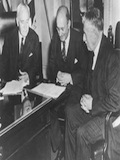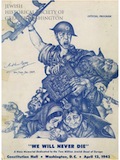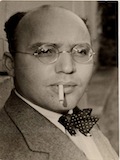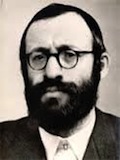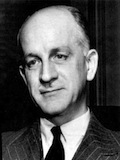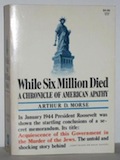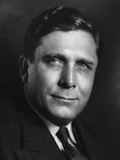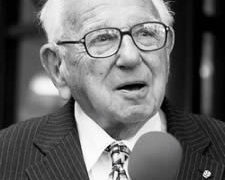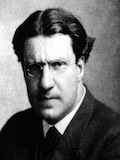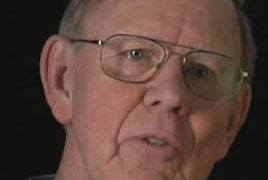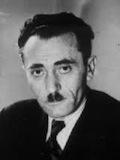Actress and acting coach Stella Adler (1901-1992) played a central role in the work of the Bergson Group during and after the Holocaust. Her parents, Sara and Jacob Adler, were stars of the early twentieth-century Yiddish...
Read more →Benjamin Akzin (1904-1985) was a staff member of the War Refugee Board and an advocate of U.S. air strikes on railways leading to the Auschwitz death camp and the gas chambers and crematoria within the camp. After...
Read more →In the wake of the November 1938 Kristallnacht pogrom, Secretary of the Interior Harold L. Ickes began promoting a plan to use Alaska as a haven for Jewish refugees. Rich in natural resources but badly underpopulated,...
Read more →During 1941-1942, the British and American governments received increasingly detailed reports about machine-gun massacres of tens of thousands of European Jews by the Nazis in occupied Russia. One eyewitness...
Read more →Joseph C. Baldwin (1897-1957), a Republican congressman from New York, strongly supported the rescue of Jewish refugees from the Nazis. Baldwin served three terms in the House of Representatives, representing...
Read more →Rabbi Meyer Bar-Ilan (1880-1949), the Jerusalem-based leader of the Religious Zionist movement, visited the United States in 1943 and took part in important meetings with government officials and American...
Read more →U.S. Senator William Warren Barbour (1888-1943), an advocate for rescue of Jews from the Holocaust, had one of the most unusual backgrounds on Capitol Hill: in 1910, he became the national amateur heavyweight...
Read more →Alben W. Barkley (1877-1956), Democrat of Kentucky, served as Senate Majority Leader from 1937 and 1947 and then as vice president under Harry Truman from 1948 to 1952. Rabbi Meyer Berlin, a leader of the...
Read more →The Rev. Louis Bauman (1875-1950), pastor of the First Brethren Church of Long Beach, CA from 1913 to 1947, was one of the few prominent Christian theologians who sought to publicize the plight of the Jews...
Read more →Yitshaq Ben-Ami (1914-1985) helped smuggle Jews from Europe to Palestine in the 1930s, then became one of the leaders of the Bergson Group's campaigns in the United States for rescue of refugees and Jewish statehood. Born...
Read more →"The Bergson Group" was the name often used to refer to a series of political action committees in the United States during the 1940s that were headed by Hillel Kook, using the name Peter Bergson. The...
Read more →Despite the Bergson Group's high profile in the 1940s, it was almost entirely ignored as the narrative of the period began to take shape in the postwar years. Mainstream Jewish leaders who clashed with...
Read more →A rising tide of calls in the British parliament, media, and churches for Allied assistance to Jewish refugees in early 1943 prodded the British Foreign Office and the State Department to plan an Anglo-American conference...
Read more →Composer and conductor Leonard Bernstein (1918-1990) was a supporter of the Bergson Group. During the war years, Bernstein anxiously following the news about the slaughter of European Jewry. His symphony...
Read more →Hiram (Harry) Bingham IV (1903-1988) played a crucial role in the underground network led by Varian Fry that rescued Jewish and other refugees from Vichy France. Bingham's father, Hiram Bingham III,...
Read more →Sol Bloom (1870-1949), a congressman from New York, strongly supported the Roosevelt administration's policies on refugees and Palestine and undermined some Jewish groups' initiatives to promote rescue...
Read more →Beginning in the late spring of 1944, representatives of Jewish organizations in the United States, Europe, and British Mandatory Palestine began urging Allied officials to take military action to interrupt...
Read more →Dr. Isaiah Bowman (1878-1950) was a key adviser to President Franklin D. Roosevelt on population settlement issues and strongly influenced the president's view of the Jewish refugee problem. He was widely...
Read more →Supreme Court Justice and American Zionist leader Louis D. Brandeis (1856-1941) tried but failed to persuade President Franklin D. Roosevelt to take a greater interest in the plight of German Jews in the 1930s. Brandeis...
Read more →Actor Marlon Brando (1924-2004) was one of the first public figures in post-World War II America to speak out about the failure of the Allies to aid Europe's Jews during the Holocaust. In the summer...
Read more →Charles A. Buckley (1890-1967), a Democratic congressman from New York, sought to open Alaska to Jewish refugees from the Nazis. First elected in 1934, Buckley represented his Bronx district on Capitol Hill...
Read more →In late 1941 and early 1942, Western diplomats and journalists received scattered information about Nazi massacres of many thousands of Jews in German-occupied Poland and Russia. But the news was difficult...
Read more →As president of Columbia University in the 1930s, Dr. Nicholas Murray Butler (1862-1947) sought to build friendly relations with Nazi Germany. In December 1933, Butler invited the Nazi German ambassador...
Read more →Women's rights activist Carrie Chapman Catt (1859-1947) spoke out strongly for U.S. action to help Jews who were persecuted by the Nazis. As president of the National American Woman Suffrage Association,...
Read more →U.S. Congressman Emanuel Celler (1888-1981) was one of the most outspoken voices on Capitol Hill for rescue of Jews from the Nazis. First elected to the House of Representatives from a heavily-Jewish...
Read more →The response of America's churches and other Christian religious institutions to the persecution of European Jews in the 1930s and 1940s was generally weak. Most American Christian leaders strongly...
Read more →Bill Clinton, the 42nd president of the United States, on several occasions publicly referred to the failure of the United States to respond adequately to the plight of Europe's Jews during the Holocaust. At...
Read more →Shortly after the German invasion of Poland in 1939, Vladimir Ze'ev Jabotinsky, the leader of Revisionist Zionism, asked the British to create a Jewish armed force to take part in the war against Hitler....
Read more →Former First Lady Grace Coolidge (1879-1957) was a prominent supporter of the Wagner-Rogers legislation of 1939, which would have admitted 20,000 German refugee children to the United States outside the quota...
Read more →Oscar S. Cox (1905-1966), an official in the Roosevelt administration, helped Treasury Department staffers in their behind the scenes efforts to promote the rescue of Jewish refugees. From 1941 to 1943,...
Read more →While he was a student at Stanford University in 1934, future U.S. Senator Alan Cranston (1914-2000) visited Germany. He was appalled by German totalitarianism and antisemitism. After graduating from Stanford...
Read more →Thomas L. J. D'Alesandro (1903-1987), a member of Congress in the 1940s, supported the Bergson Group's campaigns for rescue of refugees and Jewish statehood. D'Alesandro, a Democrat, was a member of the House...
Read more →Thomas E. Dewey (1902-1971), governor of New York and unsuccessful Republican presidential nominee, was the first candidate for the White House to raise the Nazi persecutions and Zionism as campaign issues. Dewey...
Read more →Samuel Dickstein (1885-1954), a Democratic congressman from New York, challenged the Roosevelt administration's failure to aid European Jewry. Dickstein served eleven consecutive terms in the House...
Read more →William E. Dodd (1869-1940), a University of Chicago historian, was chosen by President Franklin D. Roosevelt's as ambassador to Germany in June 1933, four months after Adolf Hitler rose to power. The president...
Read more →Treasury Department official Josiah E. DuBois, Jr. (1912-1983) was instrumental in exposing the State Department's suppression of news about the Holocaust and obstruction of opportunities for rescue. A...
Read more →State Department official James C. Dunn (1890-1979) played a key role in suppressing news about the mass murder of the Jews and obstructing opportunities for rescue. Dunn, an official in the State...
Read more →In the United States during the Holocaust, most Episcopal leaders, like most leaders of other church denominations, refrained from speaking out about the Jews' plight. But there were important exceptions. Two...
Read more →The plight of Austria's Jews in the aftermath of the Anschluss generated pressure from some Members of Congress and journalists for U.S. intervention. State Department officials decided to "get out in front...
Read more →Teenage Holocaust diarist Anne Frank (1929-1945) is the single best-known individual victim of the Nazi genocide. Her experiences, and those of her family, also figure into the history of America's response...
Read more →Supreme Court Justice Felix Frankfurter (1882-1965) was close to President Franklin D. Roosevelt but was reluctant to raise matters of Jewish concern with the president. Born in Vienna and raised in New York...
Read more →As a freshman at Smith College in 1938, Betty Friedan (1921-2006), a future leader of American feminism, unexpectedly found herself embroiled in the debate over the plight of Germany's Jews. In the wake...
Read more →During the months following the German conquest of France in June 1940, thousands of refugees, including both French Jews and exiled German Jews, fled to southern France to avoid capture by the Nazis....
Read more →James W. Gerard (1867-1951), attorney and diplomat, was an outspoken critic of Nazi Germany's persecution of the Jews. Gerard, who served as U.S. ambassador to Germany from 1913 to 1917, spoke at a number...
Read more →Guy M. Gillette (1879-1973), a three-term U.S. Senator from Iowa, was one of the most vigorous advocates in Congress for the rescue of Jewish refugees. Gillette, a Democrat, was an active supporter...
Read more →German Jewish refugee artist Eric Godal (1899-1969) drew political cartoons for various American publications in the 1930s and 1940s, often focusing on the plight of Jews under the Nazis. Born Erich...
Read more →Nahum Goldmann (1895-1992), a senior official of several Jewish organizations, was at the center of Jewish political activity during the Holocaust years, including efforts in 1944 to persuade the Allies...
Read more →Dr. Israel Goldstein (1896-1986), a Conservative rabbi, served as president of the Synagogue Council of America, and co-chairman of the American Jewish Conference, during the Holocaust years. Although...
Read more →After completing traditional yeshiva studies and earning a law degree in Vilna, Noah Golinkin (1914-2003) emigrated from his native Poland to the United States in 1938. He earned a master’s degree in American...
Read more →New York Post columnist Samuel Grafton (1907-1997) was a strong proponent of U.S. government action to rescue Jews from the Holocaust. In the spring of 1944, Grafton authored a series of columns advocating...
Read more →Dr. Frank Porter Graham (1886-1972) was a professor of history who served as president of the University of North Carolina from 1930 until 1949. During the 1930s, he became active in the Emergency Committee...
Read more →Labor Zionist activist Hayim Greenberg (1889-1953) was among the most severe critics of the American Jewish community's response to news of the Holocaust. Greenberg grew up in Russia but emigrated...
Read more →Louis D. Gross (1885-1964) was a congregational rabbi and newspaper publisher who riled mainstream Jewish leaders with his spirited calls for U.S. action to aid refugees. Rabbi Gross was spiritual...
Read more →Dutch playwright Jan de Hartog (1914-2002) used the voyage of the refugee ship St. Louis to inspire some of his countrymen to hide Jewish children from the Nazis. The son of a Dutch Calvinist Minister,...
Read more →Media magnate William Randolph Hearst (1863-1951) strongly supported the campaign for U.S. action to rescue Jews from the Holocaust. In his early years, Hearst occasionally uttered the kind of antisemitic...
Read more →Author, playwright and Hollywood screenwriter Ben Hecht (1894-1964) was a leading activist for the rescue of European Jews from the Holocaust and creation of a Jewish State. The son of Russian Jewish...
Read more →Rabbi Dr. Arthur Hertzberg (1921-2006), a prominent Jewish leader and civil rights activist who took part in the 1963 March on Washington with Rev. Dr. Martin Luther King, Jr., also participated in the 1943...
Read more →Herbert Hoover (1874-1964), the 31st president of the United States, spoke out for U.S. aid to Jewish refugees in the 1930s and 1940s. A mining engineer by profession, Hoover’s path to the 1928 Republican...
Read more →Comedian Bob Hope (1903-2003) was one of a number of prominent entertainers who volunteered to take part in a fundraising event at Madison Square Garden for the Bergson Group's Emergency Committee to Save...
Read more →Rabbi Levi Yitzchak Horowitz (1921-2009), better known as the Bostoner Rebbe, was one of the 400 rabbis who took part in the 1943 march to the White House to urge the rescue of European Jews. At...
Read more →In late 1942, President Franklin D. Roosevelt sent a Beirut-born U.S. army officer, Lt. Col. Harold Hoskins, to the Middle East to canvass Arab opinion. Hoskins's final report to the president, the following...
Read more →Laura Delano Houghteling, first cousin of President Franklin D. Roosevelt and wife of the United States Commissioner of Immigration, strongly opposed the immigration of Jewish refugees to the United States. Houghteling's...
Read more →Author and poet Langston Hughes (1902-1967) was one of a number of prominent African-American supporters of the Bergson Group. He served as one of the honorary "Sponsors" of the group's Emergency Conference...
Read more →As secretary of state under President Franklin D. Roosevelt, Cordell Hull (1871-1955) faithfully implemented the Roosevelt administration's policy of refraining from any substantial action to aid Jews...
Read more →Novelist Zora Neale Hurston (1891-1960) was one of a number of prominent African-American supporters of the Bergson Group. She served as one of the honorary "Sponsors" of the group's Emergency Conference...
Read more →As secretary of the interior under President Franklin D. Roosevelt, Harold L. Ickes (1874-1952) repeatedly found himself at odds with the president over U.S. policy toward Europe's Jews. A draft of a speech...
Read more →The National Origins Immigration bills of 1921 and 1924 imposed severe limits on immigration to the United States, reversing the nation's tradition of welcoming the downtrodden from around the world. In...
Read more →While visiting the United States in 1943, Leib Jaffe (1876-1948), an editor and poet from Palestine, sought to galvanize American Jewish leaders to respond more energetically to the slaughter of European...
Read more →By the time he was 26, Jan Karski had been imprisoned by the Soviets, tortured by the Gestapo, and nearly drowned while escaping from a hospital in German-occupied Slovakia. Had he chosen then to end his service...
Read more →Fiorello La Guardia, the feisty mayor of New York City from 1934 to 1945, spoke out forcefully against Nazi Germany's persecution of the Jews, despite political risks and the dangers faced by his own sister,...
Read more →Carl Laemmle (1867-1939), a German Jewish immigrant to the United States, was a successful Hollywood producer who helped several hundred German Jews reached the United States during the Hitler era. Universal...
Read more →As governor of Kansas, Alf Landon (1887-1987) was an early critic of the persecution of Jews in Nazi Germany, publicly condemning "the inhuman treatment now accorded the Jews in Germany" in 1933. By contrast,...
Read more →William Langer (1886-1959), Republican of North Dakota, served in the U.S. Senate from 1940 to 1959. He was a strong supporter of Jewish statehood and American action to rescue Jewish refugees. Langer...
Read more →As a young journalist in 1943, Melvin J. Lasky (1920-2004) authored an unusually stinging critique of the Allies' response to the Holocaust. Writing in the pages of The New Leader (of which he was literary...
Read more →As Franklin D. Roosevelt's lieutenant governor of New York from 1928 to 1932, Herbert H. Lehman (1878-1963) enjoyed some access to FDR as president but seldom used it. In the early 1930s, Lehman occasionally...
Read more →The Allied armies dashing toward Berlin in the spring of 1945 stumbled upon Germany's extensive network of concentration camps. But when America's newspapers, radio broadcasters, and newsreel editors reported...
Read more →Aviator Charles Lindbergh (1902-1974), a national hero for making the first solo transatlantic flight, later caused controversy by making extreme isolationist and antisemitic remarks which both outraged...
Read more →Mrs. Margaret Ashton Stimson Lindsley (1889-1956), better known as Lorna Lindsley, was a globetrotting journalist and activist whose causes including aiding Jewish refugees in occupied France. A cousin...
Read more →Although he was one of the most influential and widely-read journalists in America during the 1930s and 1940s, syndicated columnist Walter Lippmann (1889-1974) refrained from writing about the persecution...
Read more →As Assistant Secretary of State from 1940 to 1944, Samuel Breckinridge Long (1881-1958) was the senior official responsible for implementing the Roosevelt administration's policies regarding European Jewry...
Read more →Republican congresswoman Clare Booth Luce (1903-1987) was an outspoken supporter of rescue and Jewish statehood. A child actress, then a successful playwright and journalist, Clare married the influential...
Read more →Hungarian-American movie actor Bela Lugosi (1882-1956), best known for his role as Dracula, took part in protests against the persecution of European Jewry. Because of his union activism, Lugosi was compelled...
Read more →There have been a number of public controversies concerning the ways in which some historians and museums have portrayed the life and work of refugee advocate James G. McDonald. McDonald kept extensive...
Read more →James G. McDonald (1886-1964), scholar, journalist, and diplomat, served as the League of Nations High Commissioner for Refugees Coming from Germany from 1933 to 1935, was a member of the U.S. delegation...
Read more →During World War II, future U.S. senator and Democratic presidential nominee George McGovern flew bombing missions near Auschwitz. McGovern (1922-2012), a pilot of a B-24 “Liberator” plane in the 455th...
Read more →Golda Meir (1898-1978), as a leader of the Palestine Jewish community, was on several occasions involved in significant episodes related to America's response to the Holocaust. In 1938, Meir, then...
Read more →During World War II, the Roosevelt administration established a government commission, nicknamed the Monuments Men, to rescue historic paintings and monuments in war zones. Refugee advocates urged the administration...
Read more →Henry Morgenthau, Jr. (1891-1967), the only Jewish member of President Franklin D. Roosevelt's cabinet and FDR's closest Jewish friend, enjoyed regular access to the president and belatedly used it to advance...
Read more →Actor Paul Muni (1895-1967) was an active supporter of the Bergson Group's campaigns for Holocaust rescue and Jewish statehood. A native of Austria, Muni (born Frederich Weisenfreund) came to the United...
Read more →U.S. Senator James E. Murray (1876-1961), Democrat of Montana, strongly supported the Bergson Group's campaign for U.S. action to rescue European Jewry. Murray was an unlikely ally of the Jews. He was elected...
Read more →The Nation, a leading U.S. political affairs weekly, spoke out early and vociferously for government action to rescue Europe's Jews. After the 1938 Kristallnacht pogrom in Germany, the journal called...
Read more →Historian and Zionist activist Benzion Netanyahu (1910-2012), who came to British Mandatory Palestine as a child after World War I, became active in Vladimir Ze’ev Jabotinsky’s Revisionist Zionist...
Read more →While most major American magazines and newspapers buried or ignored news about the Nazi genocide, a significant exception was the weekly political magazine New Republic, which challenged the Roosevelt...
Read more →Throughout World War II, the American news media published and broadcast timely, detailed, and accurate accounts of what was happening to the Jews in Europe. The New York Times alone printed nearly 1,200...
Read more →Louis I. Newman (1893-1972) received his rabbinical ordination from Rabbi Stephen S. Wise, and served as Wise's assistant rabbi at the Free Synagogue, in New York City, before becoming the spiritual leader...
Read more →David K. Niles (1892-1952), the son of Polish Jewish immigrants (their family name was Neyhaus), came to Washington as the personal assistant of White House aide Harry Hopkins. In 1942, Niles was appointed...
Read more →On November 8, 1942, American and British forces, under the command of U.S. General Dwight Eisenhower, invaded Nazi-occupied Morocco, Algeria, and Tunisia. It took the Allies just eight days to defeat...
Read more →In 1931, two years before the Nazis rose to power, the International Olympic Committee (IOC) awarded the 1936 Olympic games to Germany. After Adolf Hitler became chancellor in 1933, anti-Nazi activists...
Read more →Soon after the United States entered World War II, the Roosevelt administration began planning for the arrest and postwar prosecution of Nazi war criminals. Even at that early stage, the Allies knew enough...
Read more →Frances C. Perkins (1880-1965), the first woman to serve in an American president's cabinet, was one of the few cabinet members who sought to promote the rescue of Jews from Nazi Germany. Perkins, who had served...
Read more →More than one thousand Jews fleeing the Nazis on the eve of the Holocaust found refuge in the Philippines, a United States territory. The rescue plan grew out of an unusual personal friendship between...
Read more →Former Roosevelt administration official Henry F. Pringle (1897-1958) was active in the Bergson Group's campaigns challenging U.S. policy on Jewish refugees. A newspaper reporter who later become a professor...
Read more →Joseph Proskauer (1877-1971), who served as president of the American Jewish Committee during the 1940s, staunchly opposed any Jewish criticism of the Roosevelt administration's refugee policy. Raised...
Read more →In the autumn of 1943, members of Congress introduced a Bergson Group-authored resolution urging creation of a government agency to rescue Jews from the Holocaust. The battle over the resolution played...
Read more →A telegram from the World Jewish Congress representative in Geneva to Western leaders played a significant role in revealing the Holocaust to the Free World. During the spring and summer of 1942, the WJC official,...
Read more →Actor Edward G. Robinson (1893-1973) was a supporter of the Bergson Group's campaign for Holocaust rescue. Robinson, whose original name was Emanuel Goldenberg, was born in Romania. Fleeing antisemitic...
Read more →Congressman Will Rogers, Jr. (1911-1993) was a vigorous advocate of U.S. action to rescue Europe's Jews, and was closely associated with the Bergson Group. Rogers, the son of the famous entertainer,...
Read more →First Lady Eleanor Roosevelt (1884-1962) tried on several occasions, without success, to persuade President Franklin D. Roosevelt to soften his positions regarding Jewish refugees. Mrs. Roosevelt,...
Read more →Franklin Delano Roosevelt (1882-1945) served as the 32nd president of the United States from 1933 to 1945, a period coinciding with the Nazi persecution of European Jewry. Roosevelt's response to the plight...
Read more →Samuel I. Rosenman (1896-1973), a justice of the New York State Supreme Court and prominent member of the American Jewish Committee, was a senior speechwriter and adviser to President Franklin D. Roosevelt,...
Read more →During the 1930s, boxing champion Barney Ross (1909-1967) became wildly popular among American Jews, who saw him as an antidote to the stereotypical image of Jews as physically unfit. Later Ross publicly...
Read more →George Herman "Babe" Ruth, the legendary baseball slugger, participated in a protest by German-Americans against the Nazi persecution of Europe's Jews. The protest was organized by Dorothy Thompson...
Read more →The Rev. Waitstill and Martha Sharp, a Unitarian couple from Massachusetts, traveled to Europe in the 1930s to rescue Jews and other refugees from the Nazis. Working in German-occupied Czechoslovakia in 1939,...
Read more →Proposals by refugee advocates to bring European Jews to the United States during World War II were often rejected by Roosevelt administration officials on the grounds that ships were not available. One official...
Read more →Rabbi Joseph B. Soloveitchik (1903-1993), longtime head of Yeshiva University's rabbinical school and the preeminent figure in shaping of Modern Orthodox Judaism, was one of the 400 rabbis who marched...
Read more →Andrew L. Somers (1895-1949), a twelve-term congressman from New York, was an active supporter of the Bergson Group's campaigns for rescue and statehood. Somers, a Democrat, was first elected to Congress...
Read more →In the aftermath of Kristallnacht, large numbers of Jews sought to flee Nazi Germany. A ship called the St. Louis, carrying 930 German Jewish refugees, set sail from Hamburg in May 1939. The passengers...
Read more →U.S. diplomat Laurence Steinhardt (1892-1950) helped impede the immigration of East European Jews to America in 1940-1941, although he later helped facilitate the escape of Jewish refugees from Hitler...
Read more →Barbara McDonald Stewart chronicled the efforts of her father, James G. McDonald, to aid refugees from Nazism and also assisted him in his post as ambassador to Israel. In 1933, McDonald, a foreign...
Read more →Henry Stimson (1867-1950) served as secretary of war under President Franklin D. Roosevelt from 1940 to 1945. He often opposed U.S. action to aid Europe's Jews during the Holocaust. Stimson justified...
Read more →English author Jan Struther (1901-1953), on a visit to the United States in 1943, publicly challenged the American public to take a greater interest in the plight of Jewish refugees. Struther created...
Read more →Painter and illustrator Arthur Szyk (1894-1951) used his art both to aid the Allied war effort and to promote the rescue of Jews from the Holocaust. In the 1930s, Szyk created a Passover Haggadah which...
Read more →U.S. Senator Robert A. Taft (1889-1953), Republican of Ohio, played a leading role in congressional initiatives promoting the rescue of Jewish refugees and the creation of a Jewish state. Taft opposed...
Read more →Statements made by William Temple (1881-1944), the Archbishop of Canterbury, in support of rescuing Jewish refugees played a role in the debate in the United States over rescue policy. In a series...
Read more →U.S. Senator Elbert D. Thomas (1883-1953), Democrat of Utah and former Mormon missionary, was an outspoken advocate of rescue of Jews from the Holocaust. Thomas grew up in Salt Lake City in the late...
Read more →Journalist Dorothy Thompson (1893-1961) spoke out vigorously against the persecution of Jews by the Nazis. As chief of the Berlin bureau of the New York Post in the late 1920s and early 1930s, Thompson...
Read more →Cyrus Vance (1917-2002) served as secretary of state from 1977 to 1980, in the administration of Jimmy Carter. While visiting the Yad Vashem Holocaust center on February 16, 1977, Vance took note of a display...
Read more →Journalist and civil rights activist Oswald Villard (1872-1949) added his name to several public protests on behalf of European Jewry. Born in Germany but raised in the United States, Villard was one of fifty...
Read more →Rudolf Vrba (1924-2006), one of the few prisoners to escape from Auschwitz, brought news of the death camp to the free world and helped galvanize the calls for an Allied bombing of the site. On April...
Read more →In early 1939, in response to the Kristallnacht pogrom, U.S. Senator Robert Wagner (D-New York) and Rep. Edith Rogers (R-Massachusetts) introduced legislation to admit 20,000 German--presumably Jewish--children...
Read more →As vice president from 1941 to 1945, Henry A. Wallace (1888-1965) showed little interest in the plight of Europe's Jews. Palestine Zionist leader Rabbi Meyer Berlin, visiting Washington in February...
Read more →Swedish businessman Raoul Wallenberg (1912 - ?), with financial backing from the U.S. War Refugee Board, rescued many thousands of Jews in German-occupied Budapest in 1944-1945. Wallenberg was recruited...
Read more →The work of the War Refugee Board in 1944-1945 represented the only official effort by the United States government to help rescue Jews from the Holocaust. The Board was handicapped from the outset...
Read more →To alert the American public about of European Jewry, screenwriter and Bergson Group activist Ben Hecht in 1943 authored a dramatic pageant called "We Will Never Die." On a stage featuring forty foot-high...
Read more →Internationally renowned composer Kurt Weill (1900-1950), exiled from Nazi Germany, used his talents to promote rescue of refugees and Jewish statehood. Weill, who is best remembered for such classics...
Read more →Rabbi Michael Dov Weissmandl (1903-1957) was the first European Jewish leader to urge Allied leaders to bomb Auschwitz and the railway lines leading to it. Weissmandl (1903-1957) grew up in Slovakia...
Read more →As undersecretary of state from 1937 to 1943, Sumner Welles (1892-1961) played a significant role in the shaping and implementation of the Roosevelt administration's policy toward European Jewry. The...
Read more →While Six Million Died: A Chronicle of American Apathy, by Arthur D. Morse, was the first book written about America's response to the Holocaust. In the aftermath of World War II, Franklin Roosevelt...
Read more →Wendell Willkie, the 1940 Republican presidential nominee, spoke out on behalf of rescuing Jewish refugees and creating a Jewish state. Willkie (1892-1944) was an early endorser of the Bergson Group's...
Read more →British stockbroker Nicholas Winton rescued more than 600 Czech children, most of them Jews, and brought them to England in 1939 after the Roosevelt administration refused to admit them to the United...
Read more →Rabbi Dr. Stephen S. Wise (1874-1949) was the most prominent and influential Jewish leader of his time. He headed an array of communal institutions, including two major defense groups, the American Jewish...
Read more →David S. Wyman, the grandson of two Protestant ministers, was born in Weymouth, Massachusetts, in 1929, and raised in Auburndale, Massachusetts. He graduated from Boston University with a bachelor’s...
Read more →Szmul (Shmuel) Zygielbojm (1895-1943), a Jewish member of the Polish government in exile, took his own life in protest against the Allies' abandonment of European Jewry. Zygielbojm, a leader of the Jewish...
Read more →



